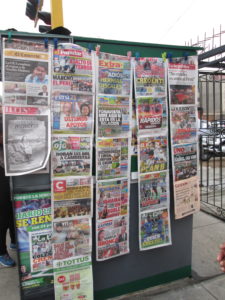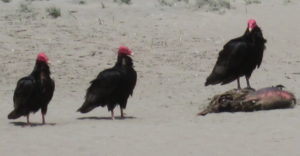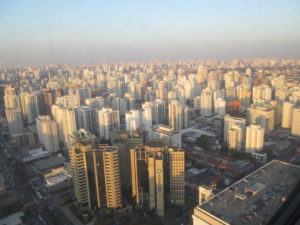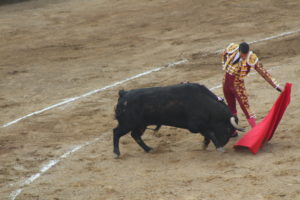Keeping it in the family – power and pride
El Comercio is Peru’s biggest daily. Its president is Jose Antonio García Miró Miró Quesada, in a town where the names of your parents matter. Jose Antonio has a father from the García Miró family, and a mother from the Miró Quesadas.
The shareholders gathered in the Business Club of San Isidro, one of the city’s most exclusive districts, next to San Isidro Golf Club, to choose a new president on 7th March. They were insufficient to make a quorum, due to the sudden death of Hernando de Lavalle García Miró. The meeting was reconvened for the following Friday.
The meeting had more to discuss than usual.
Grana and Montero is Peru’s largest and oldest construction company, and has been involved in almost every major national mining, road, energy, and gas project of the past 25 years, across four presidencies.
On many of these projects, particularly the biggest state infrastructure works, Grana and Montero has been a junior partner with Odebrecht, the Brazilian company. They have worked together on projects worth 10 billion US dollars since 2000.
For twenty years Odebrecht has taken the leading role in developing Peruvian infrastructure – roads, hydroelectric and irrigation schemes, railways and gas pipelines. Many were directly funded by the state, from central or regional government. More recently, public-private partnerships have speeded up building by enabling a management team – typically of engineering and construction companies – to finance the projects, in return for a twenty or thirty year payback period through toll roads, or operating monopoly bus services on routes.
Jose Alejandro Grana Miró Quesada (recognise the name?), the son of one of its 1933 founders, was President of Grana y Montero (GyM) until shortly before the shareholders meeting. He resigned a week earlier, after the company share price fell 35% on the Peru government’s announcement that it would cancel the gas pipeline construction and operation contract with Odebrecht, in which GyM had a 20% stake.
In early November, the share price was 8.47. It dropped sharply to 6.51 in mid-November, to 5.0 in January, and to 2.44 at the end of February 2017, as revelations from the Odebrecht case continued and the Peru government’s response evolved.
2017, as revelations from the Odebrecht case continued and the Peru government’s response evolved.
Odebrecht, it appears, has for years been systematically winning construction projects across Latin America by bribery of senior government officials. The initial contract was just the first step – contracts in Peru were then repeatedly extended and inflated by “Addendas“, amendments, signed off by government ministers and presidents.
In several cases special laws were pushed through by Presidents and senior ministers, and approved by Congress, to allow Odebrecht, a company already under investigation for corruption, to be contracted on state construction projects, as specifically forbidden under Peruvian law.
Martin Odebrecht in Brazil, in a deal with US and Swiss authorities, has agreed to reveal all about the last 16 years in return for the continuation of his company in business. Jorge Barata, the Odebrecht Managing Director in Peru, is likewise talking freely. The last three Peruvian presidents are expected to be incriminated. The current president, just six months in office, is also implicated due to his position as finance minister in a previous government.
And whilst the involvement of Grana and Montero in the Odebrecht works was well known, the company had been responding with aggrieved innocence to each new revelation. And then on February 24 it was revealed  that Jorge Barata had testified that Grana and Montero worked together with Odebrecht in the bribery scheme.
that Jorge Barata had testified that Grana and Montero worked together with Odebrecht in the bribery scheme.
“The rest of the companies [working with Odebrecht] did know, not the details, but they did know there was an agreement,” the report by Cesar Hildebrandt, Peru’s iconic investigative journalist, quotes Barata as telling the attorney general’s office. “They knew we made the payments and they knew they would have to assume their part.” Just three weeks earlier, on February 2nd, the General Manager of GyM had testified to a Commission of Congress that the company had no knowledge of any bribery.
Barata’s evidence a few weeks earlier led to Former Peru President Alejandro Toledo being sentenced to 18 months prison whilst under investigation for soliciting and receiving bribes. “He asked for 35 million” according to Barata, of which only 20 million was paid, for the construction of the InterOceanic highway between Peru and Brazil, with a consortium of Odebrecht, GyM and two other companies. Toledo declined to return to Peru and bought tickets to fly to Israel, where his wife has citizenship, but did not take the flight. He remained in hiding in the US whilst his lawyers lodged an appeal.
Jose Alejandro Grana Miró Quesada had been President of Grana and Montero for 20 years, and a director of the El Comercio Group for 23 years. The group runs 80% of the Peruvian media, including two TV channels, three daily newspapers and a free daily handed out to cars at traffic lights.
Jose Grana Miró Quesada is the major personal shareholder of the El Comercio group. His nephew, Jaime Grana, is the general manager.
Martha Meier Miró Quesada, one time columnist for El Comercio, was calling for those who were involved in Grana y  Montero to no longer have a shareholders vote. This would include Jose Grana Miró Quesada and Luis Miró Quesada Valega, president of one of the TV channels and a former director of the construction company.
Montero to no longer have a shareholders vote. This would include Jose Grana Miró Quesada and Luis Miró Quesada Valega, president of one of the TV channels and a former director of the construction company.
Martha Meier herself, once the Editor of the newspaper, was sacked from El Comercio in 2016 after she sued for libel a journalist who attacked her attack on the Mayor of Lima. Are you following so far? “The most pathetic mayor our city has suffered,” she wrote, “the lady could well pass into history as the victim of a new and unknown personality disorder, the Susy Syndrome.”
Rafael Leon, known as Rafo, one of Peru’s most experienced and respected journalists, said Martha Meier was intemperate and referred to her being “wrapped in foxes taking tea with countesses…”. Martha Meier Miró Quesada, an ardent environmentalist who appeared to take particular offence at the reference to fox furs, sued and won the case, and Rafo Leon was sentenced to a year in prison.
The law operates with eyes wide open in Peru, and Miró Quesadas normally win their cases.
One possible successor as President, replacing Jose Antonio García Miró Miró Quesada, would be Jose Antonio Miró Quesada Ferreyros, who was Vice President of El Comercio for eight years. Other candidates are Pablo Lona García Miró and Ignacio Prado García Miró.
I suggested to a friend that there was a the lack of moral values in Lima. “Instead, we have very supportive families,” she explained.
The Miró Quesadas and the García Mirós and their tangled offspring may be supporting each other, and their business projects, and their mining investments, but they act in concert and particularly through their dominant press control to keep Peru in a semi-feudal state, where two thirds of the population have little or no education, or healthcare, and the land and its resources are exploited without restraint by families that own the politicians, the media and the people.
El Comercio of March 18th named the new board of directors, which included the first ever external and independent directors.
“On Friday the General Meeting of shareholders of the El Comercio Publishing Company (now Vigenta Investments) named the new board. It is now chaired by Ignacio Prado García Miró, who will act as Operational General Manager of the group.
The Vice-President is Luis Miró Quesada Valega and the other menbers are Gabriel Miró Quesada Bojanovich, Bernardo Roca Rey Miró Quesada, Emilio Rodríguez Larraín Miró Quesada, Martha Meier Miró Quesada, Pablo Llona García Miró, Harold Gardener Ganoza, Miguel Aramburú Álvarez Calderón, Jacopo Bracco y Oliver Flogel. The last two are the first independent and external directors to be introduced.”
They are also the only two that do not have streets of the city of Lima named after their families.
Go forward to Appendix 4 _110b – Where did all the People go?
